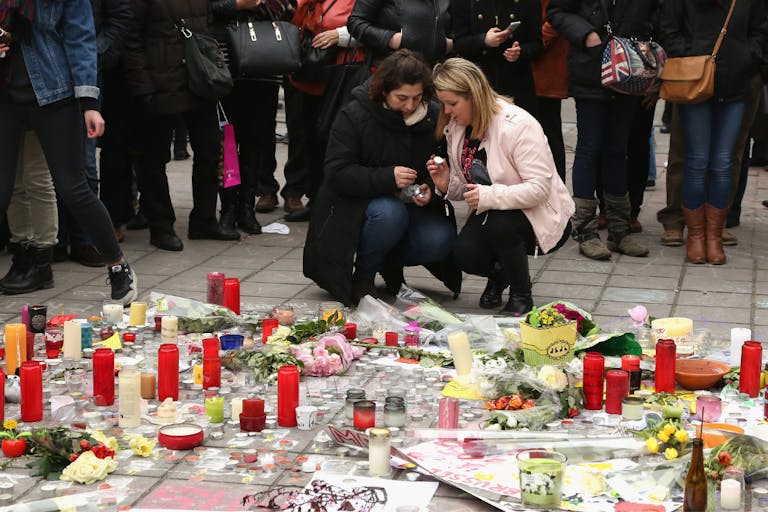
New Archbishop of Canterbury warns of danger in legalizing assisted suicide
Nancy Flanders
·
Woman euthanized in Belgium after surviving ISIS terrorist attack
A 23-year-old survivor of a terrorist attack was euthanized earlier this year in Belgium, despite concerns that not everything possible had been done to help her.
Shanti De Corte was a 17-year-old student traveling with her classmates at Brussels Airport at the time of the ISIS bombing attack in 2016. ISIS terrorists also detonated two other bombs in the Brussels subway in an attack that killed 32 and injured more than 300 people. Although De Corte was not physically injured in the bombing, the psychological scars she suffered tormented her for years, as the New York Post reported.
After the traumatizing event, De Corte went through rehab at a psychiatric hospital, and doctors placed her on a number of medications to help her deal with the panic attacks and after effects of the trauma. “I get a few medications for breakfast. And up to 11 antidepressants a day. I couldn’t live without it. With all the medications I take, I feel like a ghost that can’t feel anything anymore. Maybe there were other solutions than medications,” she said in a social media post, according to Metro.
She made two suicide attempts, once after she was sexually assaulted by another patient in 2018, and another in 2020.
But instead of searching for other avenues to heal her trauma, De Corte approached a pro-euthanasia group, who helped her find two psychologists to sign off on her request to die. Euthanasia is legal in Belgium, as noted by the Daily Mail, for people who suffer “a medically futile condition of constant and unbearable physical or mental suffering that cannot be alleviated, resulting from a serious and incurable disorder caused by illness or accident.”
De Corte requested, and received, euthanasia in May of 2022, ending her life six years after the terrorist attack.
READ: Belgium legalized assisted death 20 years ago… and 30,000 people have died as a result
According to the Daily Mail, a neurologist from the Brussels CHU Brugmann academic clinical hospital, Paul Deltenre, raised complaints about the process, attempting to halt it. After he was unsuccessful in doing so, and after the procedure was completed, Deltenre claimed that the procedure should not have happened, because other avenues of care were available, and said the decision “was made prematurely.” Due to his concern, the Antwerp prosecutor opened a case, but closed it after determining De Corte’s request to die was in accord with the euthanasia process.
“This is a deeply tragic case of a young woman who has suffered so much, and it is beyond belief that she was given a lethal injection to deal with this trauma rather than the further psychological support that she clearly needed,” Right To Life UK spokesperson Catherine Robinson said.
Since Belgium legalized euthanasia 20 years ago, only the second country to do so after The Netherlands, over 30,000 have legally ended their lives. As in many other countries, the gradual but relentless expansion of euthanasia has threatened even more of the vulnerable in society. As Right to Life News reported, Professor Benoit Beuselinck, an oncologist at the Leuven University Hospital Belgium, notes that the number of patients with non-terminal illness who have died from euthanasia has doubled in the past 10 years, to 17 percent of all cases, which encompasses primarily those who suffer from psychological and social suffering.
“Doctors then become the judge of the meaningfulness of life,” Professor Beuselinck said, according to Right to Life UK, adding that “as a solution for these problems, they have to administer death,” a fact that he notes is “twice not their job.” Professor Beuselinck believes many more have died under the law than have officially been counted.
The European Court of Human Rights recently ruled that Belgium violated the rights of a woman named Godelieva De Troyer in response to a lawsuit brought by her son, Tom Mortier, who only learned of her mother’s euthanasia after her death. De Troyer was euthanized with no other documented medical condition than chronic depression. “The big problem in our society is that apparently we have lost the meaning of taking care of each other,” Mortier said, as Live Action News reported.
“In Belgium, we can see clearly that the legalisation of euthanasia has sent a message to people like Shanti who are suffering that there is no hope,” Robinson added. “That death is the only way out. This is a deeply tragic view of life and suffering and it actively encourages this sort of thinking in people who are suffering the most. Shanti should not have died. She deserved better.”

Live Action News is pro-life news and commentary from a pro-life perspective.
Contact editor@liveaction.org for questions, corrections, or if you are seeking permission to reprint any Live Action News content.
Guest Articles: To submit a guest article to Live Action News, email editor@liveaction.org with an attached Word document of 800-1000 words. Please also attach any photos relevant to your submission if applicable. If your submission is accepted for publication, you will be notified within three weeks. Guest articles are not compensated (see our Open License Agreement). Thank you for your interest in Live Action News!

Nancy Flanders
·
Politics
Nancy Flanders
·
Politics
Rebecca Oas, Ph.D.
·
Abortion Pill
Angeline Tan
·
International
Bridget Sielicki
·
International
Angeline Tan
·
Human Interest
Laura Nicole
·
Human Interest
Laura Nicole
·
Newsbreak
Laura Nicole
·
Human Interest
Laura Nicole
·
Human Interest
Laura Nicole
·